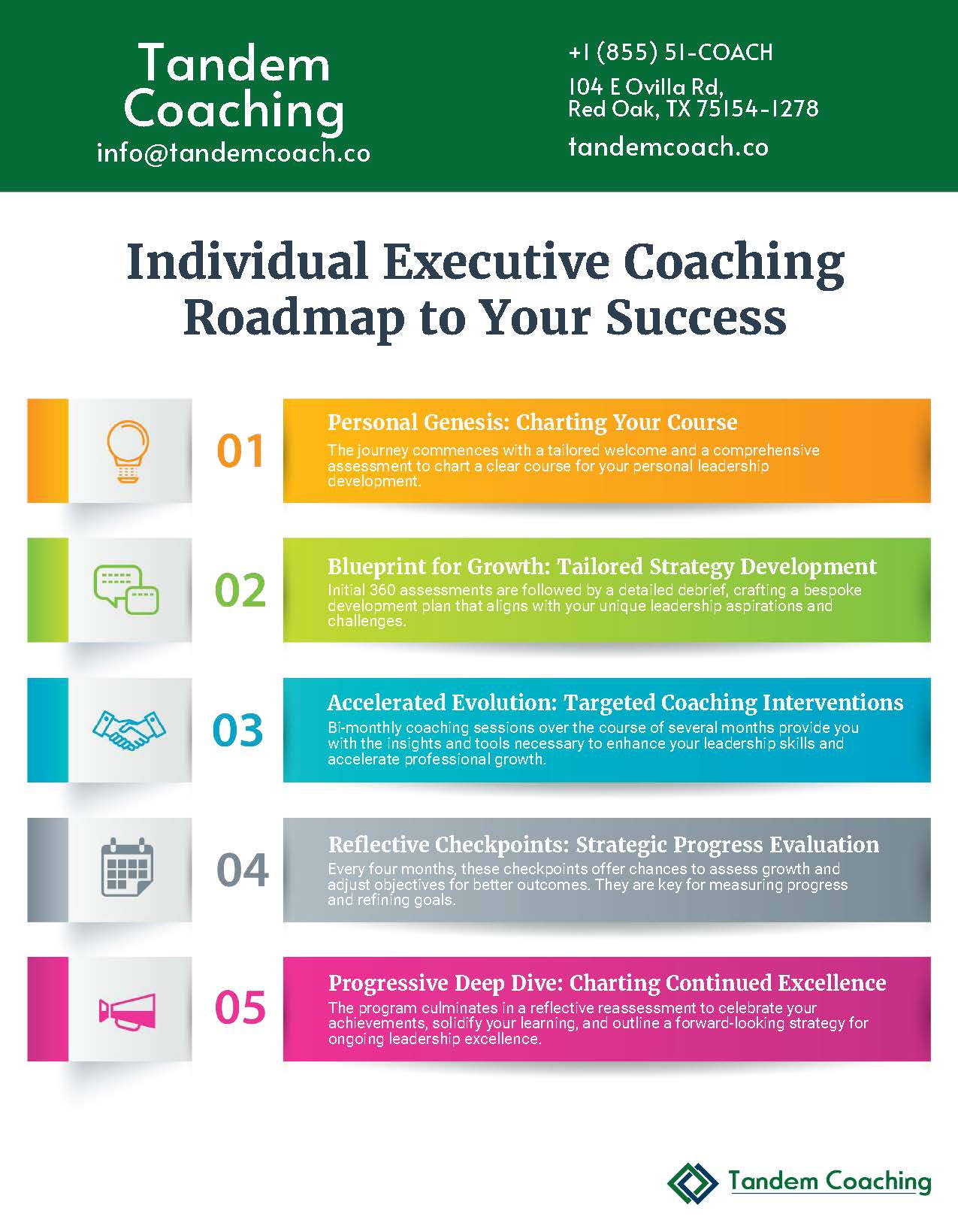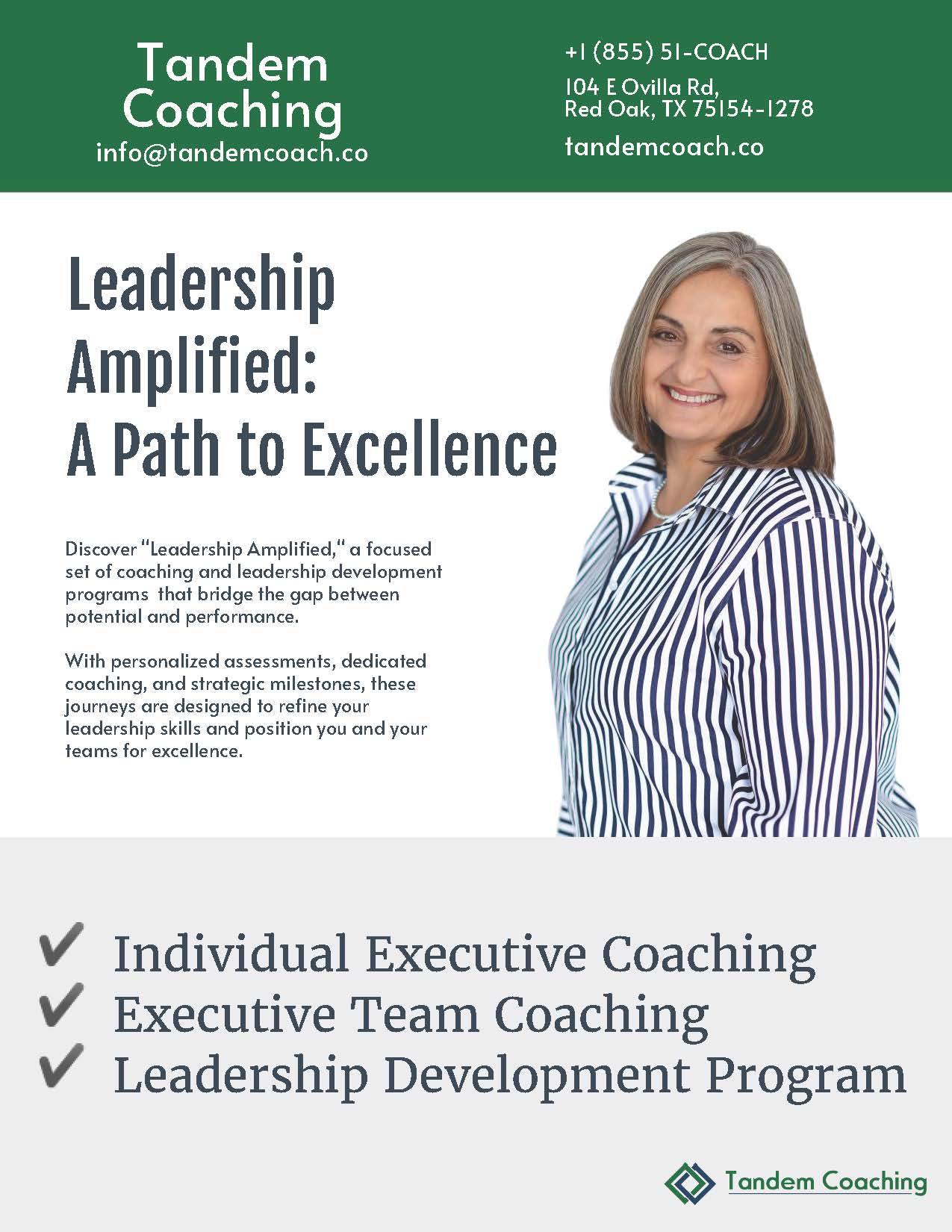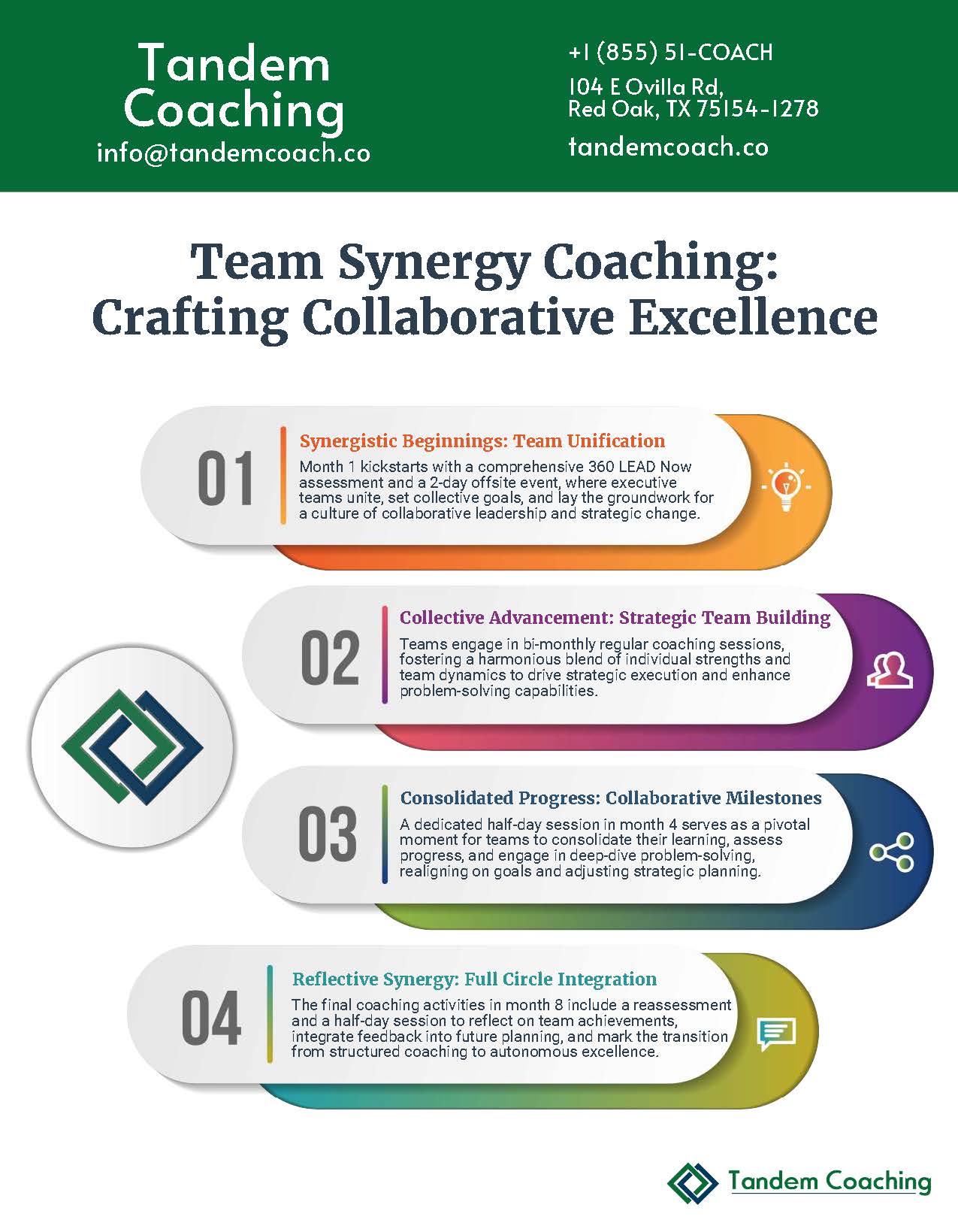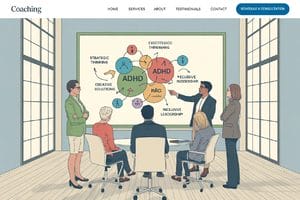Running a nonprofit can be quite challenging. Between funding uncertainties and the hassle of hiring and retaining talented staff, nonprofit leaders constantly need to bring their A-game.
The significance of executive coaching for Nonprofit leaders cannot be overstated. According to an ICF Global Coaching study, 86% of companies that invested in executive coaching made back their initial investment, 19% made over 50 times their initial investment, and 28% made between 10 and 49 times their initial investment.
Discover how Tandem Coaching can help you navigate the complexities of nonprofit leadership with our executive coaching program. Whether you are feeling stuck or you are already successful and looking to attain greater heights, our dedicated coaches will partner with you to unlock new waves of potential.
What is Executive Coaching?
Executive coaching is a transformational process involving a coach and an executive in an organization. It is a strategy that supports leaders, helping them unlock their potential and achieve the organization’s top goals.
Think of an executive coach as a professional in a specific area who guides you to become an improved version of yourself in that area. Contrary to what you might have heard, an executive coach does not tell you what to do. Instead, the coach uses proven tactics to help you better understand yourself, gain more self-confidence, and make better organizational decisions.

How Can Executive Coaching Help Nonprofit Leaders?
Leading a nonprofit is a unique task. It requires an unwavering commitment to the mission and the ability to make tough decisions.
Here are some reasons why executive coaching for nonprofit leaders is a smart investment:
Proper Work-Life Balance
If there is any sector where achieving work-life balance is challenging, it is the nonprofit sector. Workers in every sector experience burnouts, but according to reports from a Mckinsey study, the nonprofit sector is more vulnerable to this, following the nature of the work. Most nonprofits are known for having high workloads and limited resources, not to mention the mental strain that follows working towards critical social agendas.
Executive coaches can help you to set boundaries between your professional and personal life, improving the general quality of your life and making you a better leader.
Improved Decision-Making Capacities
As a Nonprofit leader, you regularly make complex decisions. Executive coaching develops critical thinking skills, which can help you make better-informed decisions. Coaching also helps build confidence and develop strategies for managing risks. Ultimately, you are empowered to make more effective decisions.
Better Leadership Skills
Leading a nonprofit without the required leadership skills will be a tough job. An executive coach helps you tackle leadership with ease. Your leadership will automatically improve by cultivating relevant skills like empathy, self-awareness, conflict resolution, communication, and delegation.

When Should Nonprofit Leaders Consider Executive Coaching?
Ideally, there are about five stages of every career, and it makes sense to consider executive coaching in all stages.
Here are the stages and reasons why you should seek executive coaching in each stage:
1. The Establishment Stage
This is where you are just stepping into a leadership role. At this initial stage, executive coaching can give you the solid foundation required to manage a team effectively.
A coach will help you develop critical thinking skills, self-awareness, and communication skills. This early investment in executive coaching can be a game-changer in your career, eventually leading to long-term success.
2. Mid-Career Level
At this point, you are fully established and have found a functional work rhythm. You may have hit some of your career goals and may be searching for new grounds to break. This is a good place to get executive coaching to combat the common challenges faced at this level.
An executive coach will work with you to reassess your goals, ensuring that you are still on the right track and helping you develop a new vision for the future.
3. Senior Executive Stage
At this stage in your nonprofit career, you should have attained a reasonable height in the organization. You should have younger leaders under your management and have a transition plan drawn up.
Crisis management is a unique challenge faced by most senior executive leaders. Executive coaching for nonprofit leaders at this stage teaches you to handle complex issues and build better interpersonal relationships.
An executive coach will help a senior leader to navigate the transition smoothly, ensuring that the executive’s succession plans do not negatively impact the organization.
4. Transitioning Stage
In this late-career phase, you are preparing to transition into new roles. A common challenge in this phase is adapting to new ethics and activities.
Getting an executive coach at this stage is relevant, as you will be taught how to build confidence and establish credibility as a veteran leader.
5. Retirement Stage
If you navigated the first four stages well, you will have a thrilling retirement.
An executive coach comes in handy here for both the retiring leader and the organization. The retiring leader learns about mentorship and legacy. You can easily settle into the role of a mentor, impacting the lives of younger leaders and leaving an indelible mark. The coach ensures the organization’s vision does not crumble with the leader’s departure.
Clearly, an executive coach is an investment that should be considered at every stage of a nonprofit leader’s career.

What is the Process of Executive Coaching?
At Tandem Coaching, we use tailored strategies to give you a personalized path to success. We combine different models depending on your desired outcome and your current situation. Our main model is the ASPIRE model, which is the most effective method for executives today.
Here is a breakdown of the ASPIRE model:
A- Assess
The first step is a complete assessment to determine your current situation, strengths and weaknesses, and areas for improvement.
Our coaches leverage available tools to gain a comprehensive understanding of both the individual and the teams.
S- Strategize
After discovering the work to be done, the coach will collaborate with you to set clear goals that align with your and the organization’s needs.
The goals should be measurable to enable both parties to track success.
P- Plan
In this planning stage, a tailored plan is developed outlining the activities and strategies used throughout the session.
I-Inspire Performance
Finally, it is time to start implementing the plan.
At Tandem Coaching, we hold weekly or bi-weekly (depending on your preference) meetings to tackle the set goals intensively.
R- Reflect on Progress
We hold regular review meetings to assess progress.
During these meetings, we discuss challenges and hurdles toward goal actualization, the coach provides feedback, and the plans are adjusted accordingly.
E- Evolve
The final stage of the ASPIRE model is a thorough evaluation of the executive coaching session. This is where the initial goals set are measured against the session’s outcome.
This evaluation ensures that the coaching session’s benefits are sustained in the long run.

Essential Qualities of an Effective Nonprofit Leadership Coach
Every effective nonprofit leadership coach has unique qualities that distinguish them. Coaching executives in such high-profile capacities is a delicate responsibility, and it should only be handled by capable professionals.
Here are some essential qualities of executive coaches for nonprofit leaders:
- Experience in the Nonprofit Sector: A strong nonprofit background is essential for coaches as it helps them relate to the sector’s challenges and tackle them effectively.
- Emotional Intelligence: The ability to empathize with the feelings and perspectives of your clients enables coaches to create more personalized solutions for leaders.
- Communication Skills: Great executive coaches listen and articulate effectively and break down complex information into simpler forms.
- Accountability: By displaying accountability in sessions, coaches are able to show leaders the importance of accountability.

Tandem Coaching: Best Executive Coaching For Nonprofit Leaders
Tandem Coaching offers customized executive coaching services for nonprofit leaders. We understand the uniqueness of every nonprofit organization, so we create personalized solutions for you. Utilizing our vast knowledge of the nonprofit sector, we collaborate with you to identify and solve specific problems.
Our proven ASPIRE model is designed to enhance your organization’s results practically. When it comes to confidentiality, you can trust us to work with you undercover, helping you surmount hurdles and become the best version of yourself.
Ready to make a greater impact in your organization? Reach out to us today.

Frequently Asked Questions (FAQs)
Got any questions for us? Here are some frequently asked questions and their answers:
How Much is Executive Coaching?
Since there are numerous types of executive coaching services, and executive coaches have different credentials, the cost of executive coaching varies. More advanced coaches with higher credentials charge more for their service.
To get a personalized price for executive coaching, get in touch with us.
How Long Does Executive Coaching Take?
At Tandem, we often recommend between 6-12 months for intensive coaching sessions. However, the exact duration of your session depends on the complexity of the challenge you are facing.
In Tandem Coaching, regular sessions are scheduled often weekly or bi-weekly. The frequency of the sessions is also based on your progress and the intensity of the work to be done.
What Are The Ethical Considerations In Executive Coaching?
Executive coaching is a sensitive program because of the nature of the sessions. Most of the time, coaches discover sensitive information about an organization.
Here are certain key ethical considerations in executive coaching:
- Confidentiality
- Informed consent
- Establishing boundaries
- Coach competence
- Diversity and inclusion
Regardless of background, gender, race, or any differences, an executive coach must display fairness in handling clients. They should be open to diversity and inclusion, personal bias aside.
Conclusion
Looking at it critically, you will discover that executive coaching is a worthy investment for nonprofit leaders. The benefits of this program are undeniable, spanning both the individual being coached and the organization at large.
Furthermore, the ROI from executive coaching makes it more worthwhile.
Ready to level up your nonprofit? Discover customized executive coaching solutions with Tandem Coaching today. Let’s get started!



Boost Your Leadership Team Success!
Take your leadership team to the next level and achieve great results with our executive coaching.
Learn how our coaching and ASPIRE method can change things for you—get a free brochure to begin your journey.
About the Author
Cherie Silas, MCC
She has over 20 years of experience as a corporate leader and uses that background to partner with business executives and their leadership teams to identify and solve their most challenging people, process, and business problems in measurable ways.
![Why is Leadership Development Important? [Quick Answer]](https://cdn.tandemcoach.co/wp-content/uploads/2024/08/TC-215.jpg)














